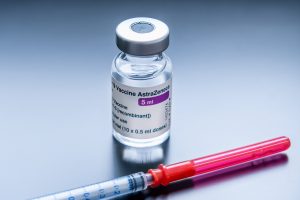On October 7, the World Health Organization said that it had resumed shipments of COVID-19 medical supplies to North Korea, for the first time since January 2020. At the same time, North Korea has yet to receive vaccines to fight the pandemic – and still officially reports zero cases. The North’s recalcitrance to join the international vaccination effort is extreme. Like the iconic nighttime satellite image of a dark North Korea surrounded by a sea of light from South Korea and China, North Korea is a blank in global maps of national COVID-19 vaccination programs.
It’s a big puzzle, even for North Korea.
North Korea’s tentative engagement with the international community in vaccine diplomacy has not yielded any results. Meanwhile, South Korea recently said it would donate more than 1 million doses of AstraZeneca’s vaccine to Vietnam, while the United Kingdom has pledged a vaccine swap with Seoul. Even the heavily sanctioned government of Venezuelan President Nicolas Maduro accepted a sizable shipment of vaccines from the international COVAX facility in September. Cuba, a fellow poverty-stricken communist nation, actually has the sixth highest vaccination rate in the world: 81 percent of its citizens have received at least one dose of vaccine – higher than the United States. In early September, however, North Korea refused nearly 3 million doses of China’s Sinovac COVID-19 vaccine, offered at no cost through the international COVAX initiative.
What is happening? Without vaccines to combat the spread of the virus, North Korea’s only policy response since January 2020 has been to seal itself off from the outside world, bucking an emerging trend among elsewhere that recognizes the limits and futility of nationwide lockdowns and border closures. For example, Argentina is pivoting from one of the world’s strictest lockdowns to a rapid reopening – a shift driven in large part by politics (the unpopular democratically elected government is facing an election). Such political pressures are nonexistent in totalitarian North Korea. In May, for instance, state media warned that vaccines produced overseas were “not a panacea to all problems.” There is little the international community can do in such circumstances, as has been proven in countless attempts to engage North Korea since 1994’s Agreed Framework, a deal struck between Washington and Pyongyang to freeze the latter’s nuclear program.
Pyongyang is also likely concerned about the reporting requirements needed to participate in the COVAX scheme. North Korea’s comfort zone is total control of information and access. Its leadership probably fears that information gathered by international public health workers would expose the developmental shortcomings of the country and weaken the blind loyalty of its citizens.
Aside from the North’s obsession with secrecy, the logistical challenges of vaccine distribution are also formidable. North Korea has neglected to develop a modern public health infrastructure and has shunned any significant international assistance gestures. Pyongyang refused a request by U.N. Secretary-General Antonio Guterres to plan for the potential return of aid workers to help distribute any potential shipments of vaccine into the country.
North Korea’s vaccine hesitancy might also reflect vaccine snobbery. According to some observers with knowledge of the North’s public health bureaucracy, the government is holding out for mRNA technology, and has reportedly shunned the less effective Sinovac and Russian Sputnik V vaccines. North Korea also seems to have been spooked by early safety concerns associated with the AstraZeneca vaccine.
Next year marks the 20th anniversary of the formation of the Kaesong Industrial Complex – a joint economic development in proximity to South Korea’s Incheon Airport and just across the demilitarized zone. The promise of a bright and prosperous future for the Korean Peninsula catalyzed by the joint venture between North and South Korea now lies in ruins. Meanwhile, a cutting-edge biopharmaceutical industry has sprung up in Songdo, South Korea. Songdo is already becoming a regional hub for vaccine production, including mRNA vaccines. If North Korea had followed a different developmental path, had opened up and had joined the international community, it would be in a better position today to manage the challenges of the pandemic.
North Korea’s fixation with weapons development, totalitarian control, and secrecy for regime survival continues to prove unfortunate for its citizens. Without access to vaccines, North Korea’s least risky option is to keep its borders closed, given the susceptibility of its largely malnourished population to COVID-19 infection and disease. Until Kim Jong Un pivots to initiate a national vaccination program, he is at least being honest in admitting in April that North Koreans should brace for the “worst-ever” outcome – invoking the country’s devastating 1990s famine.
































